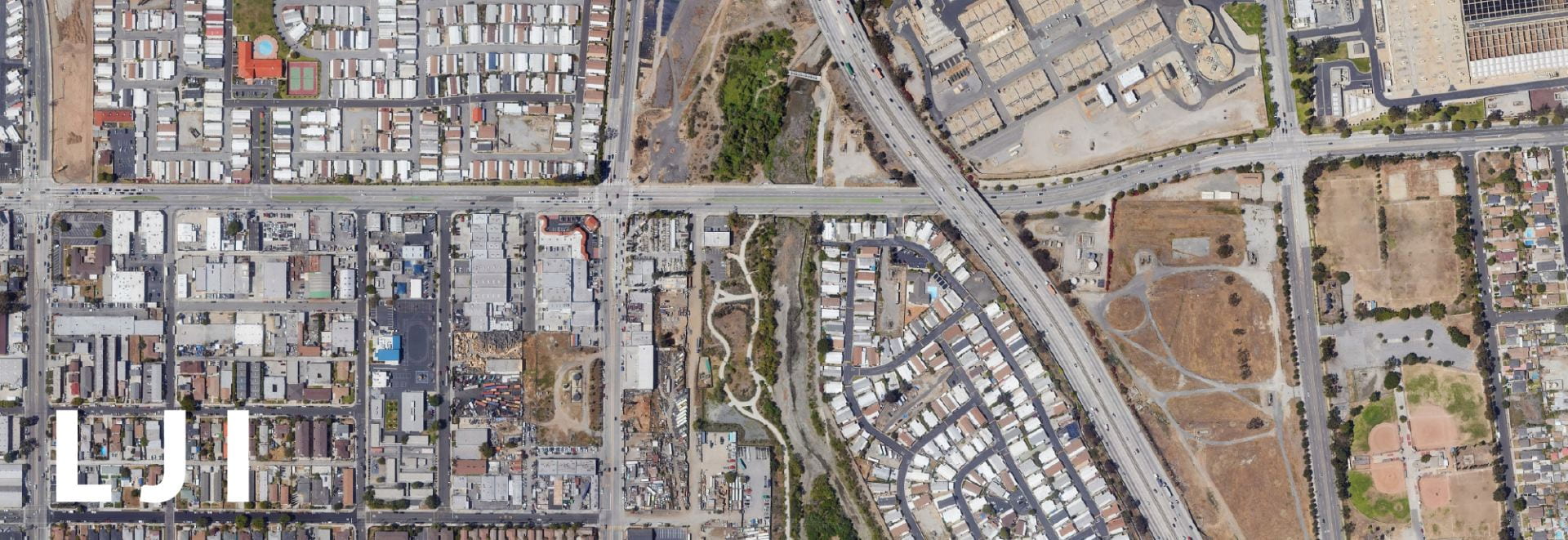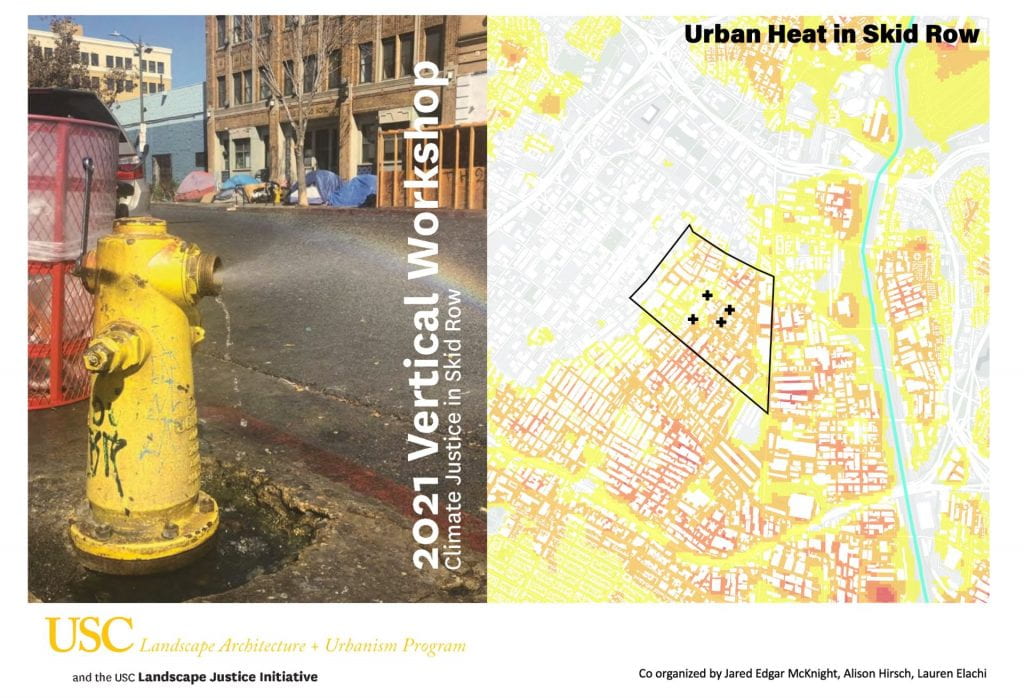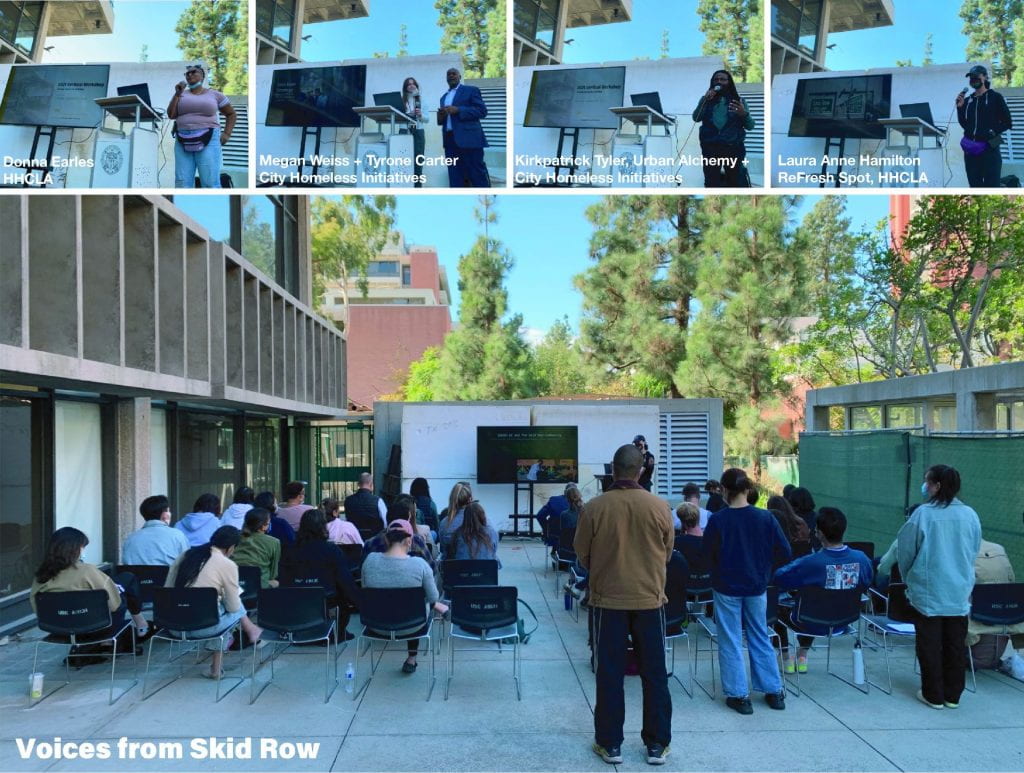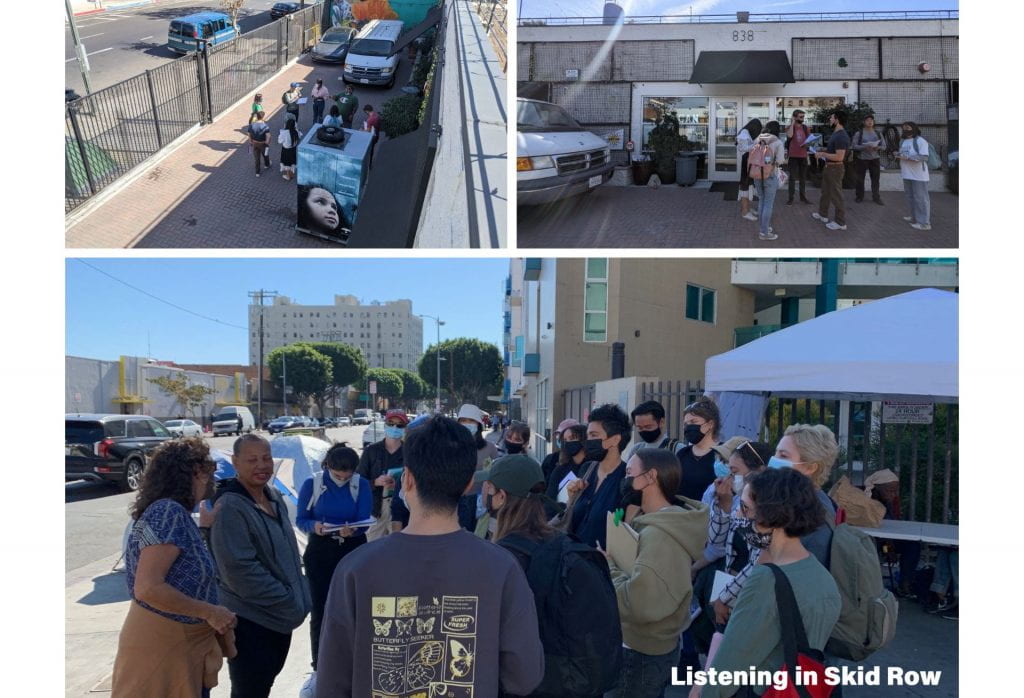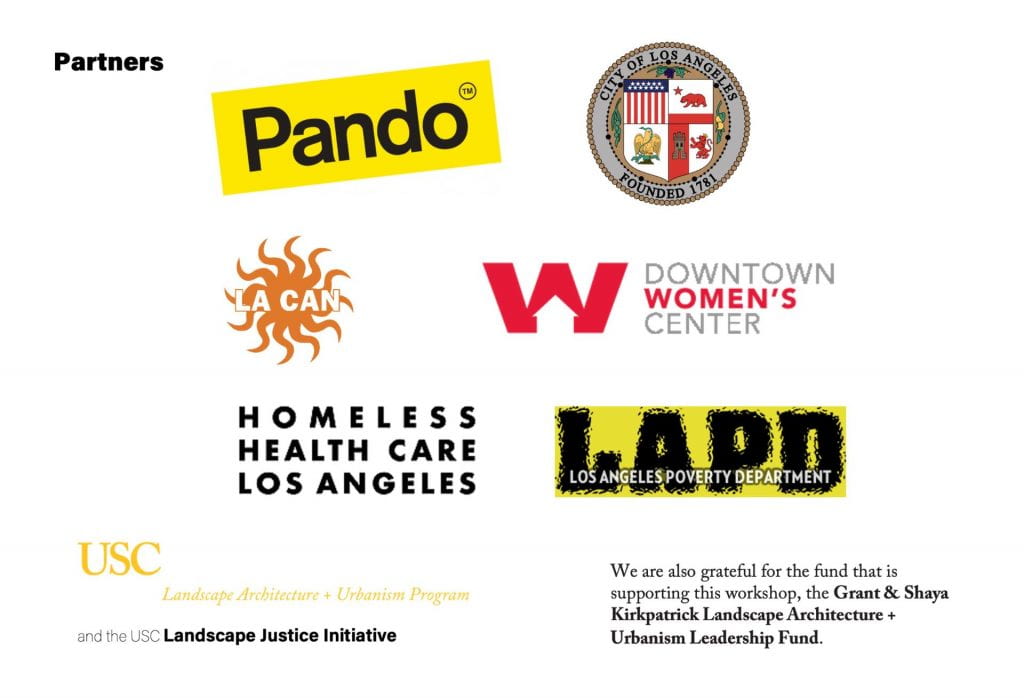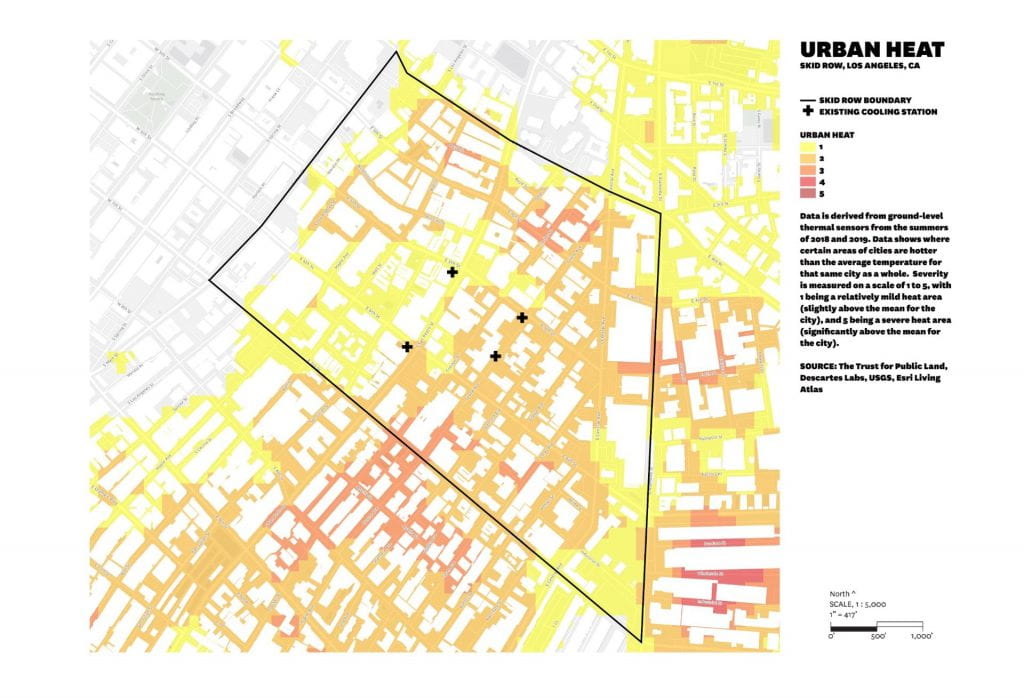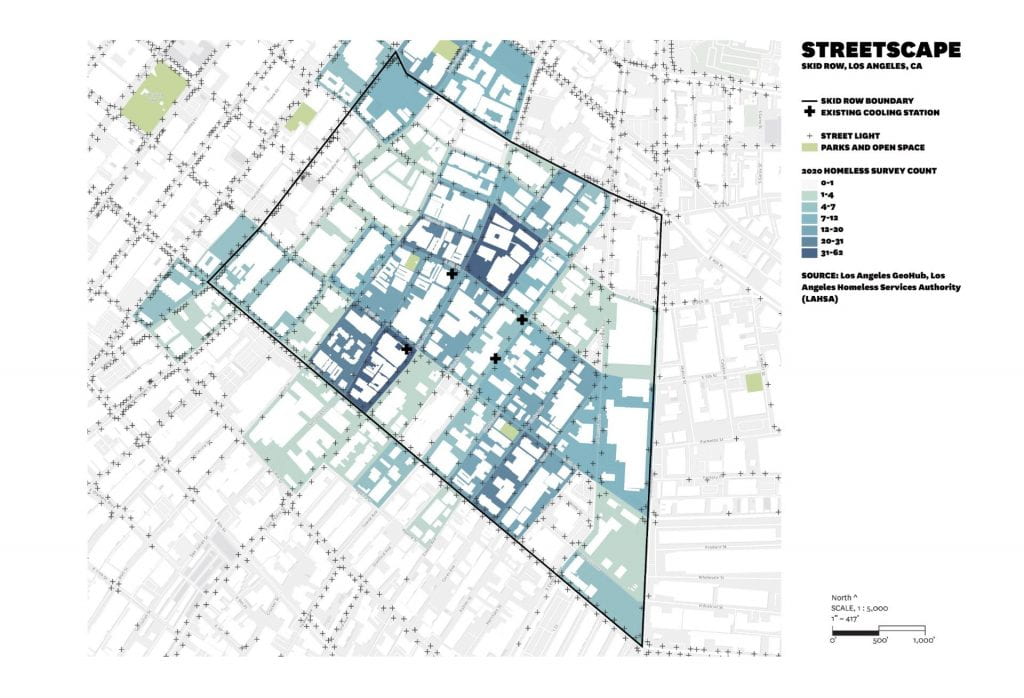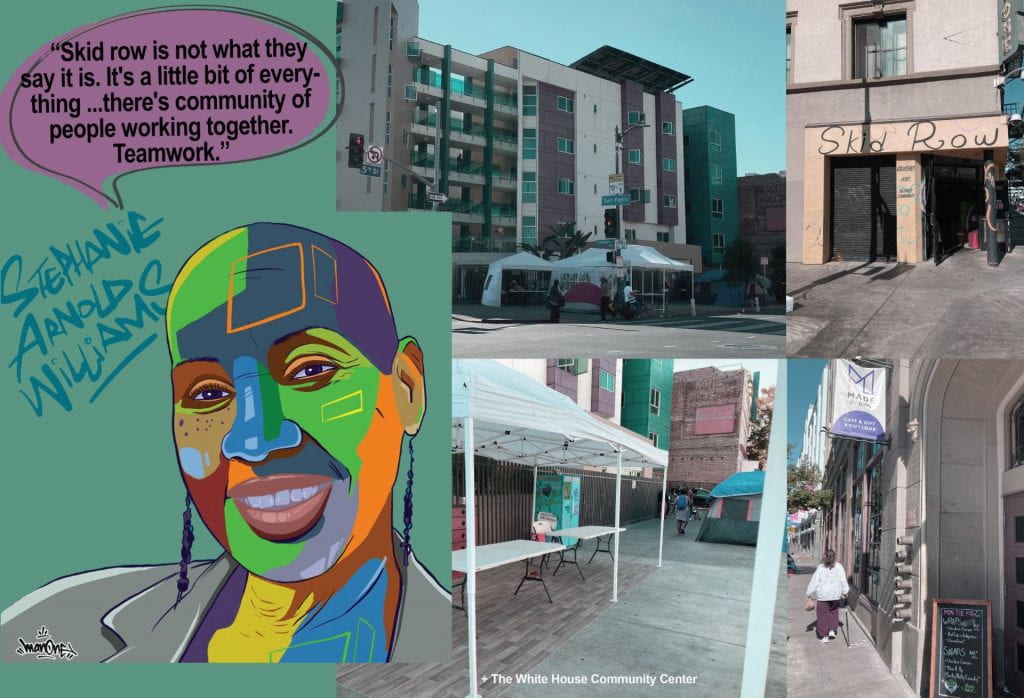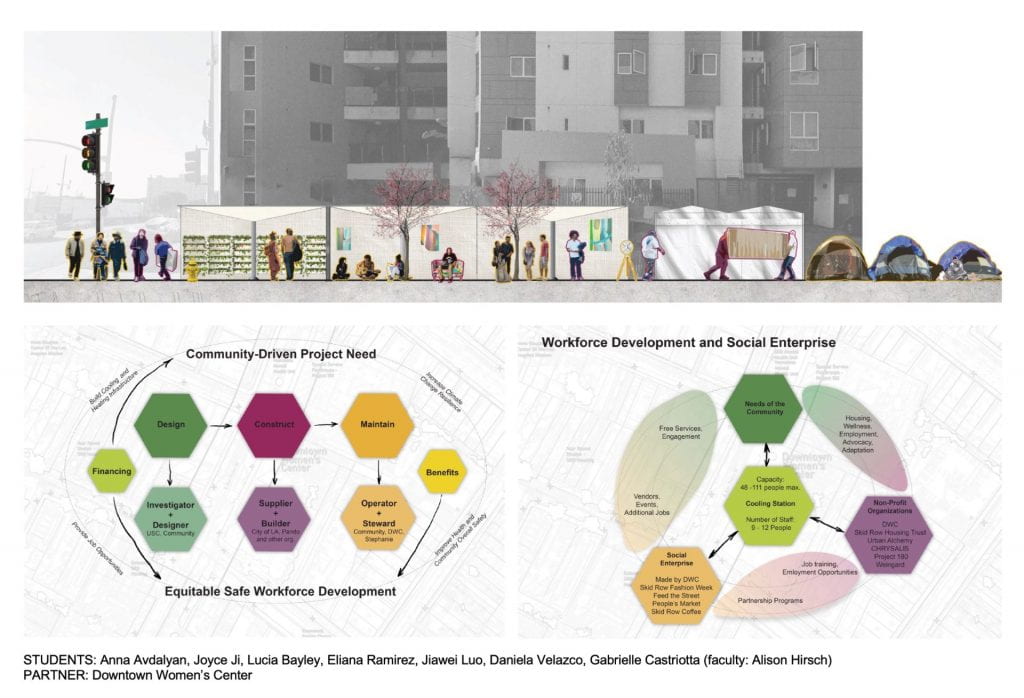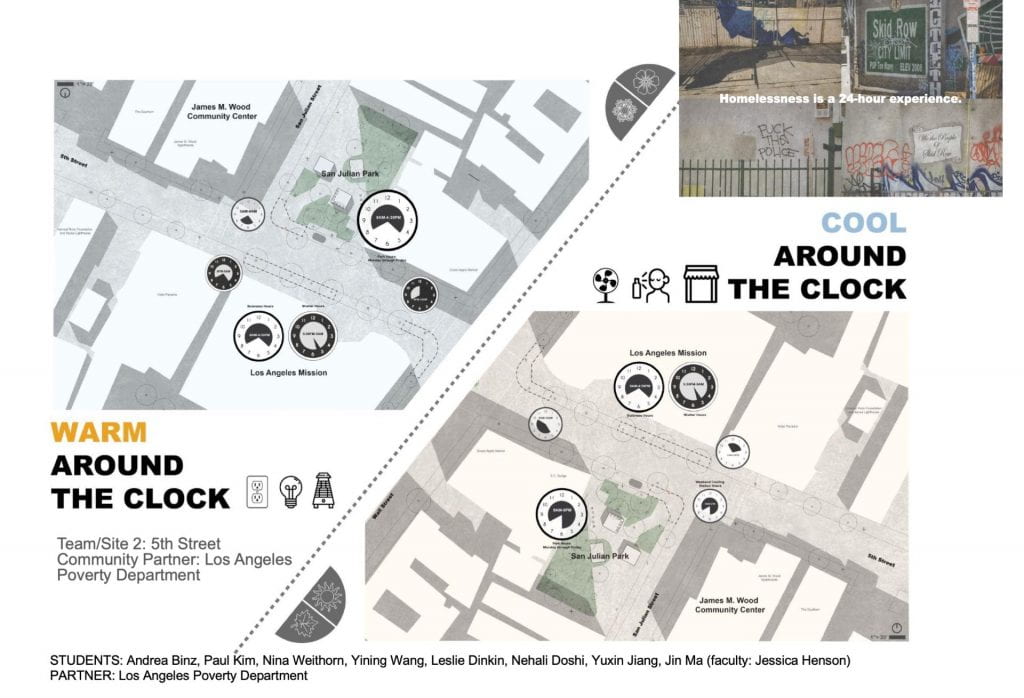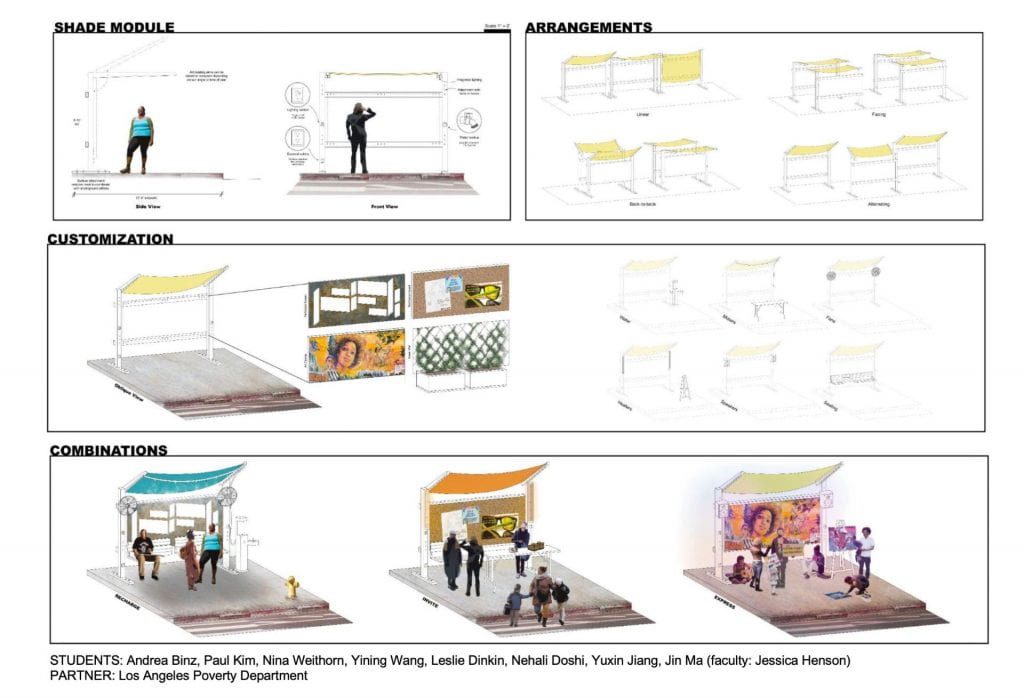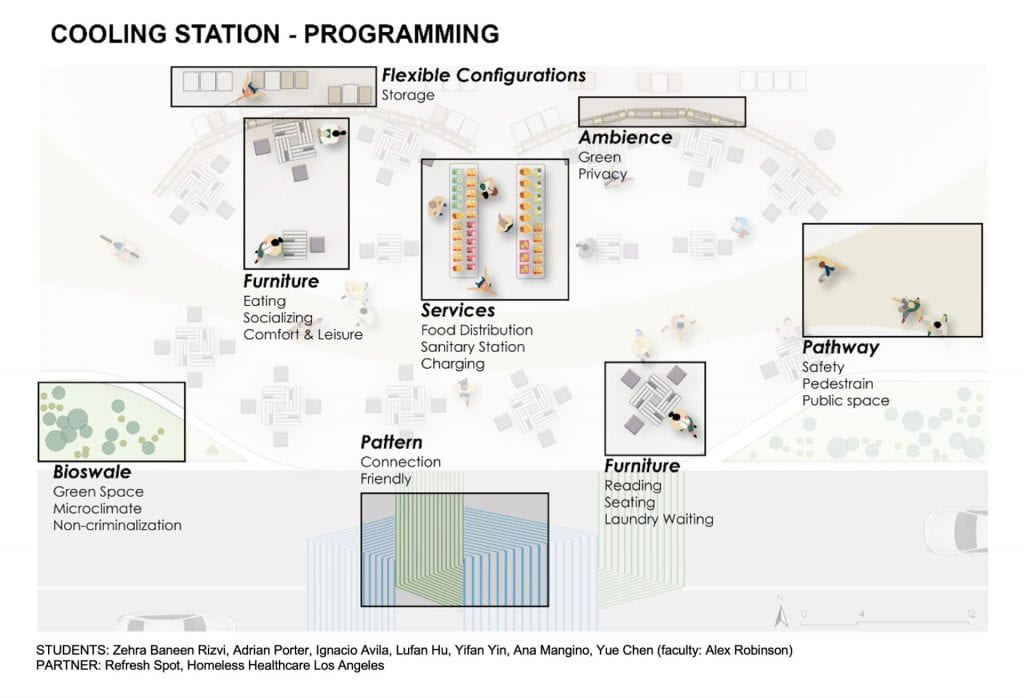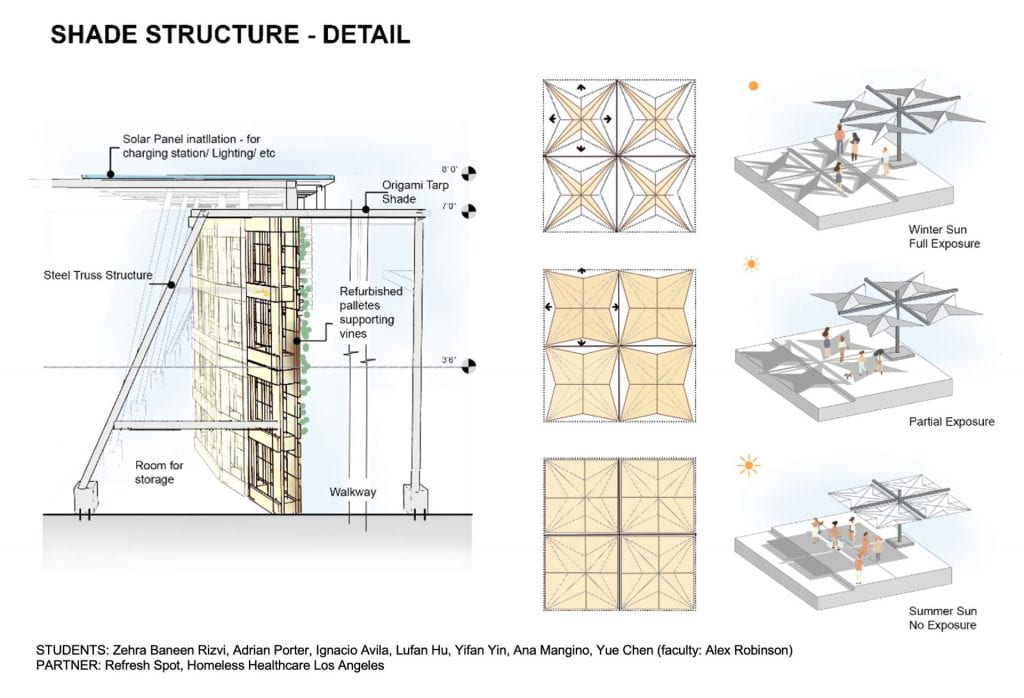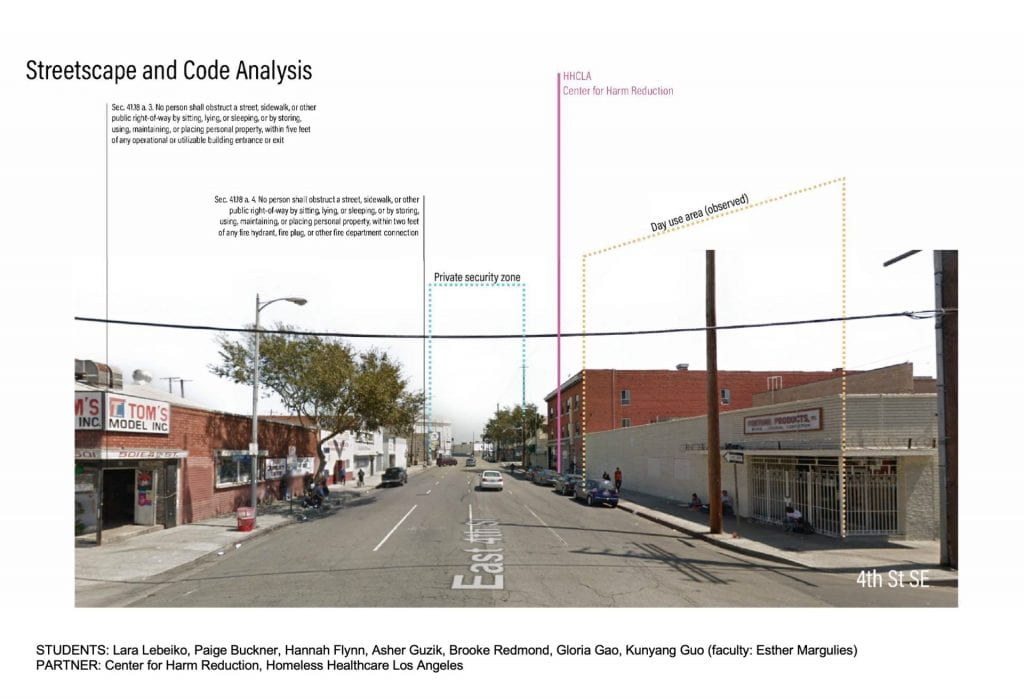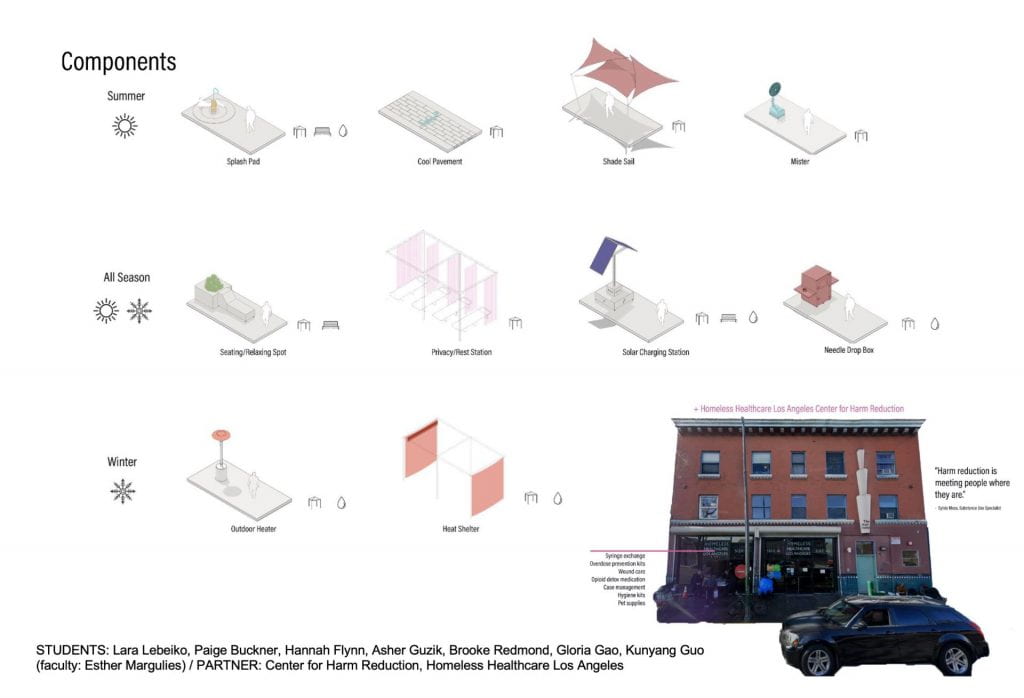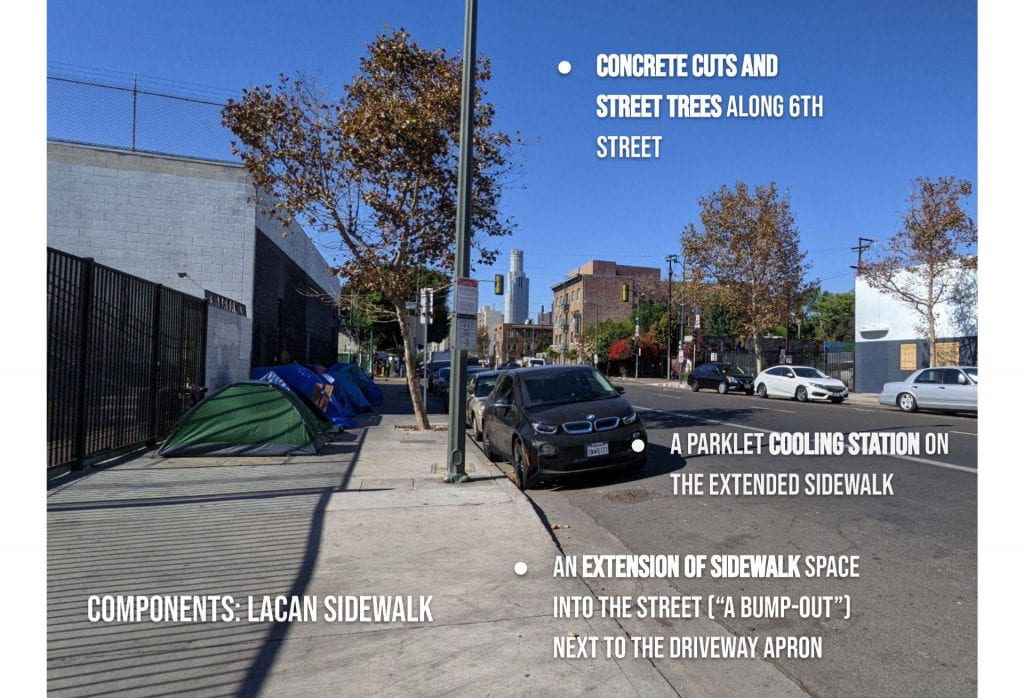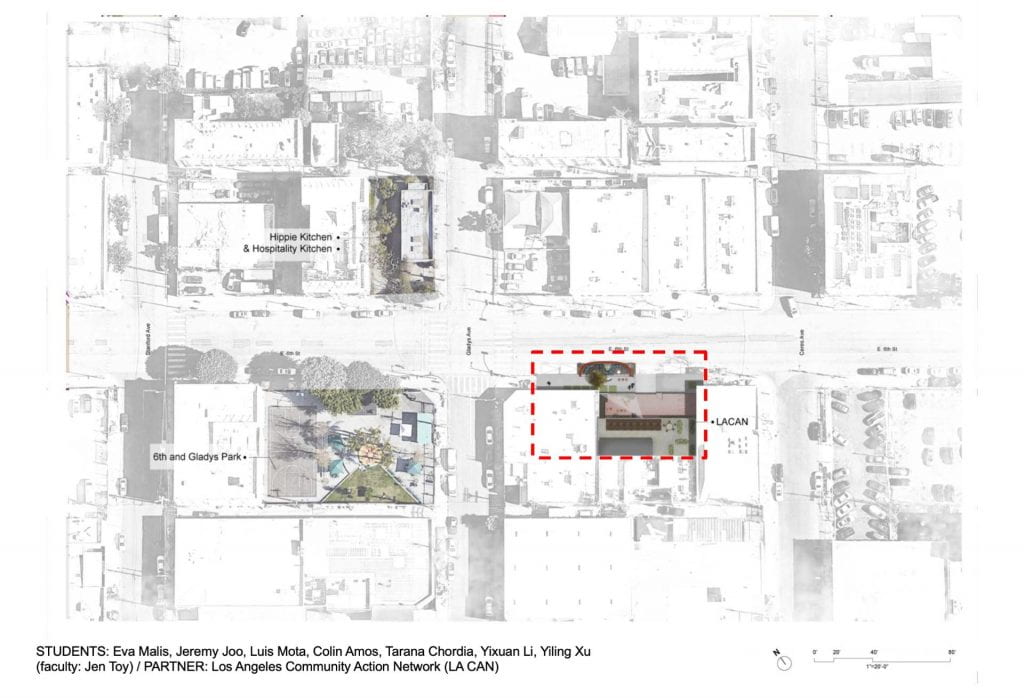Jared Edgar McKnight, PI, Alison Hirsch, PI, Lauren Elachi, Co-PIWith students: Andrea Binz, Lara Lebeiko, Eva Malis, Zehra Baneen Rizvi, and the MLA+U 2021-2022 cohort (for Vertical Workshop)Project Partners: Pando, City Homelessness Initiatives, Office of Los Angeles Mayor Eric GarcettiProject Advisors: Homeless Health Care Los Angeles (HHCLA), Los Angeles Community Action Network (LA CAN), Downtown Women’s Center (DWC), Los Angeles Poverty Department (LAPD)Supported by Pando Days and USC School of Architecture’s Grant & Shaya Kirkpatrick Landscape Architecture + Urbanism Leadership FundThis project won First Place in the 2021 Pando Days competition.Click here to see the workshop program.2021 |
Climate Justice in Skid Row (2021)Click here to view the final report. While permanent supportive housing must remain the unwavering goal to address the humanitarian crisis of LA’s 66,000+ unhoused individuals, the reality is that goal is taking time to achieve. Supportive interim strategies are critical and must continue to be developed. This project imagines 5 sites in Skid Row to build on the City’s current ‘Cooling Station’ projects as nodes of an expanded network of public space that have the capacity to better support and provide relief to those who occupy it. The establishment of daily routines around the reliable access to basic needs is made more difficult by extreme heat events and an unequal distribution of shade. According to LA County’s Department of Public Health, “heat causes more deaths in the U.S. each year than floods, storms, and lightning combined…” and impacts vulnerable populations most, especially persons experiencing homelessness. One of the most effective ways to combat extreme heat is to increase the urban forest cover, but even this seemingly simple solution carries weight in a context like Los Angeles’ Skid Row where the LA Municipal Code continues to criminalize unhoused individuals (and where trees might be considered hostile landscape architecture intended to push encampments away, while codes protect trees from “harmful attachments” that might target unhoused individuals). Enduring discrimination for their very existence, unhoused individuals must navigate misdemeanor arrests attributed to “quality of life” violations which [among other things] prohibit sitting, lying or sleeping on sidewalks (LAMC§41.18), or the storage of personal belongings (LAMC§56.11). What if pilot urban cooling projects in Skid Row began to engage the unhoused community to develop possible solutions, pairing impactful cooling interventions with solutions that enhance access to basic needs like hydration, hygiene, and electricity, or better engage individuals in the provision of social services and resources? Student Workshop The USC Master of Landscape Architecture + Urbanism program engaged in a Vertical Workshop from October 18-25, 2021. Groups of students, mixed across the three years of the graduate curriculum, were tasked with investigating sites in Los Angeles’ Skid Row community with a focus on climate justice, urban cooling and multi-benefit infrastructures that engage local organizations providing services on the ground in Skid Row. Proposals simultaneously addressed urban cooling strategies in advancement of the city’s homeless initiatives and LA County’s sustainability plan: OurCounty, while also understanding, considering, and designing for the unique needs of unhoused individuals in a way that does not criminalize them. The weeklong workshop was a small but important part of a much longer MLA+U program engagement effort with the organizations and agencies working with the Skid Row community, starting in Fall 2020. PROJECT PARTNERS, ADVISORS, SPONSORS This project built on research and community partnerships that were formed from the Fall 2020/Spring 2021 design-research seminar and studios, and the current Fall 2021 Independent Study, as part of Pando Days. Pando Days is a program that brings together educators from the arts, humanities, sciences, and technology to tackle the biggest sustainability challenges facing LA. Pando innovates at the intersection of education and public agencies to implement the goals of Los Angeles County’s sustainability plan, OurCounty. PARTNERS Pando, https://pandopopulus.com Pando innovates at the intersection of education and public agencies to implement the goals of Los Angeles County’s Sustainability Plan, aiming to make the world a community of more resilient communities. Pando uses their own project acceleration process to take on issues that matter to LA’s future. The process includes leveraging the County’s talent pool in new ways to deliver innovative ideas and practical plans with measurable impact. Pando is a 501(c)3 nonprofit organization based in Los Angeles County. City Homelessness Initiatives, Office of Los Angeles Mayor Eric Garcetti The Mayor’s Office of City Homelessness Initiatives (MOCHI) oversees the Mayor’s strategy to solve homelessness and housing instability in Los Angeles. The office directs the City’s street strategy to address encampments, the development of interim housing citywide through the “A Bridge Home” program, and the production and preservation of affordable and supportive housing for Angelenos who are homeless or at risk of becoming homeless, including oversight of the Prop. HHH program. MOCHI guides the regional planning efforts alongside our County and State partners on effective homelessness interventions, including in Skid Row, the epicenter of our crisis. ADVISORS Homeless Health Care Los Angeles (HHCLA), https://www.hhcla.org HHCLA helps people wherever they are on their journey, both physically and spiritually, without judgment. They are the largest harm reduction organization in the US and provide needle exchange, naloxone for overdose reversal, housing, hygiene services and medical and behavioral health services. Their programs include the Center for Harm Reduction, Refresh Spot, and Skid Rover, and they provide street team outreach, training and education, behavioral health programs, and connections to permanent housing for people affected by homelessness throughout Los Angeles. Los Angeles Community Action Network (LA CAN), https://cangress.org The mission of LA CAN is to help people dealing with poverty create & discover opportunities, while serving as a vehicle to ensure they have voice, power & opinion in the decisions that are directly affecting them. LA CAN organizes and empowers community residents in Skid Row and South Central LA to work collectively to create systemic change. LA CAN’s constituency consists of extremely low-income and homeless people, primarily those living in Downtown LA and South Central LA. LA CAN recruits organizational members and builds indigenous leadership within this constituency to promote human rights and address multiple forms of oppression faced by extremely low-income, predominately African-American and Latino, residents. Downtown Women’s Center (DWC), https://downtownwomenscenter.org The Downtown Women’s Center (DWC) is the only organization in Los Angeles focused exclusively on serving and empowering women experiencing homelessness and formerly homeless women. Founded in 1978, DWC was the first permanent supportive housing provider for women in the US. Its mission is to end homelessness for women in greater Los Angeles through housing, wellness, employment, and advocacy. Los Angeles Poverty Department (LAPD), https://www.lapovertydept.org Los Angeles Poverty Department (LAPD) was founded in 1985 by director-performer-activist John Malpede. LAPD was the first performance group in the nation made up principally of homeless people, and the first arts program of any kind for homeless people in Los Angeles. LAPD believes in the power of imagination to motivate people -and not only artistically by acknowledging the hopes, dreams, rational and spiritual power at the core of everyone’s humanity. LAPD’s activities and projects have used theater and other arts to thematically focus on a constellation of inter-related issues of continuing importance to Skid Row, and other low-income communities. SPONSORS The Master’s Program in Landscape Architecture + Urbanism and the Landscape Justice Initiative would like to acknowledge the The Grant & Shaya Kirkpatrick Landscape Architecture + Urbanism Leadership Fund for sponsoring this important workshop and expanded project.
|
